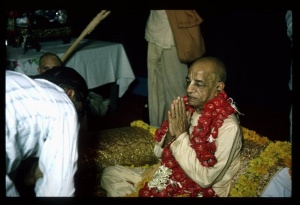SB 9.6.54: Difference between revisions
m (1 revision(s)) |
No edit summary |
||
| Line 1: | Line 1: | ||
{{info | {{info | ||
|speaker= | |speaker=Śukadeva Gosvāmī | ||
|listener=King | |listener=King Parīkṣit | ||
}} | }} | ||
[[Category:Srimad-Bhagavatam - Canto 09 Chapter 06]] | |||
[[Category:Bhagavatam Verses Spoken by Sukadeva Gosvami - Vanisource|090654]] | |||
<div style="float:left">'''[[Srimad-Bhagavatam]] - [[SB 9|Ninth Canto]] - [[SB 9.6: The Downfall of Saubhari Muni|Chapter 6: The Downfall of Saubhari Muni]]'''</div> | |||
<div style="float:right">[[File:Go-previous.png|link=SB 9.6.53]] '''[[SB 9.6.53]] - [[SB 9.6.55]]''' [[File:Go-next.png|link=SB 9.6.55]]</div> | |||
{{RandomImage}} | |||
==== TEXT 54 ==== | ==== TEXT 54 ==== | ||
<div | <div class="verse"> | ||
tatra taptvā tapas tīkṣṇam | :tatra taptvā tapas tīkṣṇam | ||
ātma-darśanam ātmavān | :ātma-darśanam ātmavān | ||
sahaivāgnibhir ātmānaṁ | :sahaivāgnibhir ātmānaṁ | ||
yuyoja paramātmani | :yuyoja paramātmani | ||
</div> | </div> | ||
| Line 17: | Line 22: | ||
==== SYNONYMS ==== | ==== SYNONYMS ==== | ||
<div | <div class="synonyms"> | ||
''tatra''—in the forest; ''taptvā''—executing austerity; ''tapaḥ''—the regulative principles of austerity; ''tīkṣṇam''—very severely; ''ātma-darśanam''—which helps self-realization; ''ātmavān''—conversant with the self; ''saha''—with; ''eva''—certainly; ''agnibhiḥ''—fires; ''ātmānam''—the personal self; ''yuyoja''—he engaged; ''parama-ātmani''—dealing with the Supreme Soul. | |||
</div> | </div> | ||
| Line 24: | Line 29: | ||
==== TRANSLATION ==== | ==== TRANSLATION ==== | ||
<div | <div class="translation"> | ||
When Saubhari Muni, who was quite conversant with the self, went to the forest, he performed severe penances. In this way, in the fire at the time of death, he ultimately engaged himself in the service of the Supreme Personality of Godhead. | When Saubhari Muni, who was quite conversant with the self, went to the forest, he performed severe penances. In this way, in the fire at the time of death, he ultimately engaged himself in the service of the Supreme Personality of Godhead. | ||
</div> | </div> | ||
| Line 31: | Line 36: | ||
==== PURPORT ==== | ==== PURPORT ==== | ||
<div | <div class="purport"> | ||
At the time of death, fire burns the gross body, and if there is no more desire for material enjoyment the subtle body is also ended, and in this way a pure soul remains. This is confirmed in Bhagavad-gītā ( | At the time of death, fire burns the gross body, and if there is no more desire for material enjoyment the subtle body is also ended, and in this way a pure soul remains. This is confirmed in [[Bhagavad-gita As It Is (1972)|''Bhagavad-gītā'']] (''tyaktvā dehaṁ punar janma naiti'' ([[BG 4.9 (1972)|BG 4.9]])). If one is free from the bondage of both the gross and subtle material bodies and remains a pure soul, he returns home, back to Godhead, to be engaged in the service of the Lord. ''Tyaktvā dehaṁ punar janma naiti mām eti:'' he goes back home, back to Godhead. Thus it appears that Saubhari Muni attained that perfect stage. | ||
</div> | </div> | ||
__NOTOC__ | |||
<div style="float:right; clear:both;">[[File:Go-previous.png|link=SB 9.6.53]] '''[[SB 9.6.53]] - [[SB 9.6.55]]''' [[File:Go-next.png|link=SB 9.6.55]]</div> | |||
__NOTOC__ | |||
__NOEDITSECTION__ | |||
Revision as of 14:17, 15 May 2021

A.C. Bhaktivedanta Swami Prabhupada
TEXT 54
- tatra taptvā tapas tīkṣṇam
- ātma-darśanam ātmavān
- sahaivāgnibhir ātmānaṁ
- yuyoja paramātmani
SYNONYMS
tatra—in the forest; taptvā—executing austerity; tapaḥ—the regulative principles of austerity; tīkṣṇam—very severely; ātma-darśanam—which helps self-realization; ātmavān—conversant with the self; saha—with; eva—certainly; agnibhiḥ—fires; ātmānam—the personal self; yuyoja—he engaged; parama-ātmani—dealing with the Supreme Soul.
TRANSLATION
When Saubhari Muni, who was quite conversant with the self, went to the forest, he performed severe penances. In this way, in the fire at the time of death, he ultimately engaged himself in the service of the Supreme Personality of Godhead.
PURPORT
At the time of death, fire burns the gross body, and if there is no more desire for material enjoyment the subtle body is also ended, and in this way a pure soul remains. This is confirmed in Bhagavad-gītā (tyaktvā dehaṁ punar janma naiti (BG 4.9)). If one is free from the bondage of both the gross and subtle material bodies and remains a pure soul, he returns home, back to Godhead, to be engaged in the service of the Lord. Tyaktvā dehaṁ punar janma naiti mām eti: he goes back home, back to Godhead. Thus it appears that Saubhari Muni attained that perfect stage.